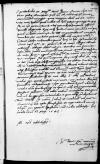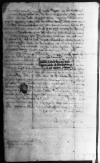Letter #2647
Ioannes DANTISCUS to Sigmund von HERBERSTEINCracow, 1543-05-23
English register:
Having received from Herberstein his "[poetic] monument", Dantiscus reciprocates by describing his aversion to life, stemming from the awareness that in such difficult and dangerous times, human reasoning and strength are of no consequence. He has hope in divine mercy. He regrets that because of illness he was unable to attend the feast held by Samuel Maciejowski, the bishop of Płock, where he could have talked freely to Herberstein, and that he also lacks the strength to visit him. He understands that numerous duties prevent Herberstein from visiting him. He wishes Herberstein a safe journey and asks him to remind King Ferdinand I that Dantiscus is a loyal servant.
Manuscript sources:
Prints:
| ||||||
Text & apparatus & commentaryPlain textText & commentaryText & apparatus
Illustri libero baroni, domino
Spectabilis et Magnifice Domine baro, amice observandissime.
Non potui committere, cum mihi Magnificentia Vestra virtutum suarum monumentum[1] misisset, quin vicissim darem ad Magnificentiam Vestram vitae meae taedium[2], quod nullus non habere potest, quisquis ea, quae se in iis gravissimis atque periculosis temporibus offerunt, exacte dispiciat. Quae neque humana ratio, prudentia vel quicquid in homine virium est, si Dei misericordia non accesserit, avertere seu mutare poterit. Ille nostri misereatur. Ceterum doleo vehementer, quod 1543-05-22⌊heri1543-05-22⌋ in hoc splendido convivio apud
Ex lecto
Magnificentiae Vestrae addictissimus
[1] Most likely a reference to the print containing a piece by Johann Ludwig Brassicanus titled Monumentum domini Sigismundi liberi baronis in Herberstain, Neipperg, Guttenhag etc. conciliarii regii (see CEID 2.1, Appendix).
[2] One can guess that in return for the print of Monumentum, Dantiscus sent Herberstein a work of his own. This could have been, for example, the extensive Carmen paraeneticum, iuvenibus huius temporis non inutile, ad ingenuum adulescentem Constantem Alliopagum, published in Cracow in 1539. In it, Dantiscus analyzes his own life for moralizing purposes. In the context of the words vitae meae taedium in the commented letter, the following line attracts attention: Perpessus vitae taedia longa meae ( Dantisci Carmina, No. XLII, 2,: Carmen paraeneticum, p. 175, l.162).
[3] Herberstein wrote about Dantiscus’ illness in his report from the marriage and wedding of Elizabeth von Habsburg (OSK, Quart. Germ. 163, p. 132): .
[4] Before leaving Cracow (May 25,
1543) for Vienna, less than two days after the date of the mentioned letter, Herberstein accompanied by Niklas II zu Salm visited Dantiscus as he lay ill. This was probably their last meeting (see Herberstein 1855, p. 360; Jagiellonki, I, p. 112; cf.


 ONB, Cod. 13.597, f. 41v
ONB, Cod. 13.597, f. 41v